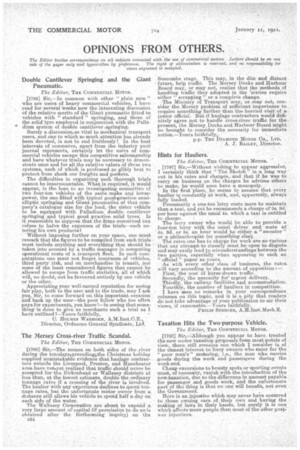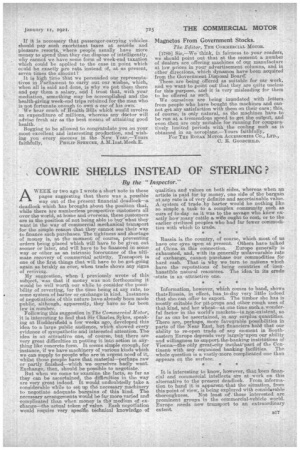OPINIONS FROM OTH E RS.
Page 22

Page 23

If you've noticed an error in this article please click here to report it so we can fix it.
The Editor invites correspondence on all subjects conneeted with the use of comnusrcial•motors. • Letters should be on one side of the paper only and typewritten by preference. The right of abbreviation is reserved, and ma responsibility for views expressed is accepted.
Double Cantilever Springing and the Giant Pneumatic.
The Editor, ME COMMERCIAL MOTOR.
[1785] Sie,—In common with other " plain men" • who are users of heavy earnmexcial vehicles, I have read for several iveeks now the interesting discussion of the relative merits of the Giant pneumatic fitted to • vehicles with " standard" spring-rag, and those of the solid'tyre employed in conjunction with the Pallas ditun system of double cantilever,springing.
Surely a discussion, so vital to mechanical transport users' and one to which so much attention has already been devoted, is not to end fruitlessly ? In the best interests of -commerce, apart from the industry your journal represents, certainly let the users of commercial vehicles escape this competitive salesmanship and have whatever trials may be necessary to demonstrate once and for all the relative values of these two systems, each of which is professed so glibly best to protect from shook our freights and pockets.
The difficulties in organizing such thorough trials cannot be insurmountable. What is required, it would appear, is the loan to an investigating committee of two four-ton vehicles of the same make and horsepower, the one fitted with typical goodepraetiee semielliptic springing and Giant pneumatics of that com-. pany's catalogue size for the load, the sister vehicle to be equipped with Palladium double cantilever springing and typical good practice solid tyres. Is it reasonable to suppose that the firms concerned can refuse to halve the expenses of the trials—each entering his own productst Without imposing further on your space, one must remark that the figures to be compikci from such. trials must include anything and everything that should be takei into account by a trafficmanager in computing operational costs of a. transport fleet. In such computations one must not forget insurance of vehicles, third party risk, and on merchandise in transit, nor some of the least remembered figures that cannot be allowed to escape from traffic statistics, all of which will, no doubt, not be favoured entirely by one vehicle or the other.
Appreciating your well-earned reputation for seeing fair play, both to the user and to the trade, may Task you, Sir, to come forward on this important occasion and back up the user—the poor fellow who too often pays for experiments, you know ?—in seeing that something is done to give us merohants such a trial as I have outlined I—Yours faithfully, C. HOLMES WAOHORN, Director, Ordnance General Syndicate, Ltd.
The Mersey Cross-river Traffic Scandal.
The Editor, THE COMMERCIAL MOTOR.
(1786] Sir,—The scenes on both sides of the _river during the tensda.yseorecedingsthe Christmas holiday supplied unmistakable evidence that haulage contractors outside the Liverpool, Preston, and Manchester area have r otiyet realized that traffic ,should never be accepted for the Birkenhead or Wallasey districts at less than, at the lowest estimate, double the ordinary tonnage rates if a crossing of the river is. involved. The haulier with any experience declines to quote tonnage rates, but the unfortunate motor owner from a distance still allows his vehicle to spend half a day on. each side of the water.
The Wallasey Corporation are about to expend a. very large amount of' capital (if permission to do so-is obtained after the fbrthcosning inquiry) on the
c24 Seacombe stage. This may, in the dim and distant future, help traffic. The Mersey Docks and Harbour Board may, or may not, realize that the methods of handling traffic they adopted in the 'sixties require either scrapping " or a, complete change.
The Ministry cif Transport may,. or may not, consider the Mersey problem of sufficient importance to require something further than the hurried visit of a-. junior official. But if haulage contractors would definitely agree not to handle cross-river traffic for the present, the Mersey. Docksand Harbour Board might be brought to .consider the necessity for immediate action.—Yours faithfully' pp. THE J.-MALONE MOTOR Co., LTD.
A. J. BAILEY, Director.
Hints for Hauliers:
The Editor, THE COMMERCIAL MOTOR.
[1787] Sir,—Without wishing to appear aggressive,
certainly think that "The' Skoteh is ,a long way.' out in his rates and charges, and that if he was to carry on business on the charges he advises others to make, he would soon have a monopoly.
In the 'first 'place, he seems to assume that every haulier is' constantly at work, and, apparently, always fully loaded.
Presuraably a one-ton lorry costs morello maintain than a taxi, and yet he recommends a charge of Ss. 9d. per hour against the usual 48. which .a taxi is entitled to charge.
The lorry owner who would he able to provide a four-top. lorry with, the usual driver, and mate at 4s. 9d. or 5s. an hour would be either a " sweater " or a philanthropist (or something else).
The rates one has -to charge for work are so various that any attempt to classify must be open to, disputeand may easily lead to misunderstandings between the two parties, especiillY when appearing in such an " official " paper as yours.
As with every othei class of business, the rates_ will vary according to the amount of opposition:— First, the cost Of horse-drawn traffic.
Secondly, the neceSsity for urgent delivery. Thirdly, the railway facilities apd accommodation. Fourthly, the number of hauliers in' competition. I have seen no remarks in your correspondence eolumns on this topic, and it is a pity that readers do not take advantage of your publication to air their views, if reasonable--Yours faithfully,
• PHILIP SPEsTesa, A.M.InStMech.E.
Taxation Hits the Two-purpose Vehicle.
The Editor, THE COMMERCIAL MOTOR.
[1788] Sir,Although you appear tohave treated the new motor taxation picoposals. 'from most points of view, there still remains one which I consider is of . the utmost interest, to lorry..owners who eater for the pour man's" motoring,i.e-, the man who carries goods during the week and passengers during the week-end.
Cheap excursions to beauty spots or sporting events must, of necessity, vanish with the introduction of the new taxation, due to the difference in amount payable for passenger and goods work, and the unfortunate . part of the thing is that no one will benefit, not even the Government. Here is an injustice which may never have occurred to those owning. ears of their own and having the making of laws in their hands, but surely it is one which affects more people than most of the other post-. War injustices. If it is necessary that passenger-carrying vehicles should pay such exorbitant taxes at seaside and pleasure resorts, where people usually have inoTe money to spend than they can dispose of intelligently, why cannot we have some form of week-end taxation which could 'be applied to the case in point which could -be, exactly rpro rata instead of, at as present, seven times the amount?
It is high time that we persuaded our representatives in Parliarnent to carry out our wishes, which, when all is said and done, is why we put them there and pay them a salary, and I trust that, with your. mediation, something may be accomplished and the heaAth-givmg week-end trips retained for the man who is not fortunate enough to own a car of his own.
'We hear much of Health Bills which would involve an expenditure of millions, whereas any ciGetor will advise fresh air as the best means of attaining good health.
Begging to be allowed to congratulate you on your .most excellent and interesting production, and wishing you every success in the New Year,—Yours faithfully, PHTLIP SPENCER, A.M. Inst. Mech. E.
Magnetos From Government Stocks.
The Editor, THE COMMERCIAL MOTOR.
[1789] Sir,—We think, in fairness to your readers, we should point out that at the moment a number of dealers are offering machines of our manufacture at low prices in your advertisement oblunms, and in other directions, which dynamos have been acquired from the Government Disposal Board.
These are being offered as suitable for car Work, and we want to point out that they are quite useless for this. purpose, and it is very. misleading for them
to he offered as such.
We ourselves are being inundated with letters. from people who have bought the ma-chines and cannot get any satisfaction with them on their cars; this, of course, is only natural, as the machines have to be run at a. tremendous speed to get the output, and even-then are only suitable for running for comparatively limited periods with the cooling such as is obtained in an aeroplane.—Yours faithfully,. For THE ROTAX MOTOR ACCESSORIES CO., LTD., C. IL GOODCHILD.
































